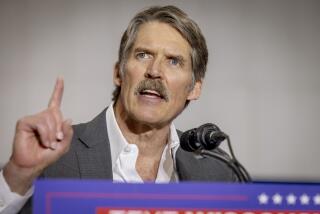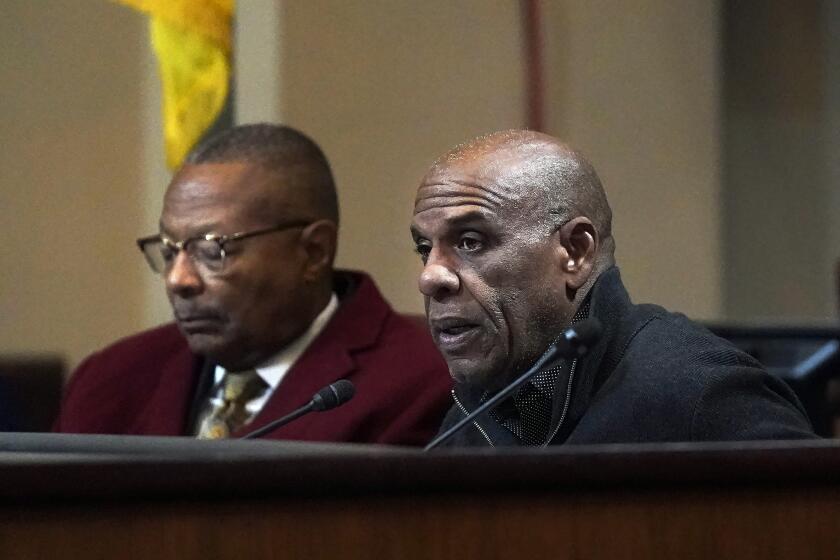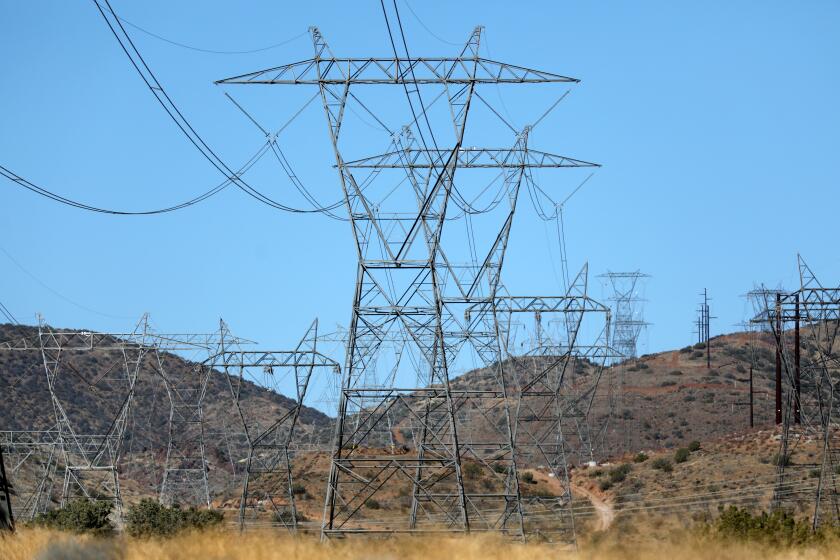A CONFIDENCE CRISIS
The forces threatening the United States with a major recession can’t get the national attention they deserve while our leaders, most notably the new president and dynastic heir George W. Bush and the departed pardoner-in-chief Bill Clinton, indulge in their respective games of trivial pursuit. Maybe somebody ought to give the two of them kid-lettered signs that say “Crumbling Confidence Levels ‘R’ Us.”
From the start, awareness of the new president’s inexperience has guided the highest circles of the Bush family, namely father George and mother Barbara. Thus, besides the analogies to previous royal restorations in Europe, there have been media portraits of Vice President Dick Cheney as the de facto prime minister who governs, while George W. handles the ceremonies and kindergarten visits. Still others have likened Cheney, Defense Secretary Donald H. Rumsfeld and Secretary of State Colin L. Powell to the wise regents appointed in yesteryear’s monarchies to hold the reins until a boy king comes of age.
Unfortunately, the parallel is becoming riskier. Recent declines in the University of Michigan and Conference Board consumer-confidence levels, the nose dive of the tech-bloody Nasdaq and the increasing skittishness of consumer spending make it possible, if still not probable, that the props could be sliding out from under the economy. Federal Reserve Chairman Alan Greenspan, in this week’s congressional testimony, no longer seemed to have a clear view of what the economy is doing. If he equivocates much longer, maybe he should get to hold the third sign.
Private and international debt is hanging over this country like an executioner’s ax, and all Greenspan can do is expound on how we’re paying off the national debt. The evidence of history, unfortunately, is that the biggest economic downturns often come after the biggest booms. And if a serious recession is unfolding, its effects could be aggravated by a partial collapse of the record build-up of household debt. Then they could be further aggravated if the country’s huge international indebtedness, now growing by some $400 billion a year, leads to a reversal of money flows, as foreigners decide they no longer want to keep their eggs in the U.S. economic basket.
Clinton, the Democrats’ continuing image problem, seems to have an attention-deficit disorder: If he isn’t in the spotlight, he has a disorder--and he’s in danger of turning into the court jester of national politics. His tacky behavior in recent weeks, mostly in the matter of his last-minute pardons of fugitive financier Marc Rich and others, is preoccupying Congress and the media because it proves that Clinton will be just as scuzzy an ex-president as he was a sitting president; and that no other major Democrat can compete with him in the attention sweepstakes, a potential disaster for the Democratic congressional leadership.
The Republicans’ trivial-pursuit problem is on both Capitol Hill, where Clinton’s misbehavior is center stage, and in the White House, where Bush seems to be having as much trouble thinking clearly as he does speaking clearly. Since his address to Congress Tuesday night and the release of his budget the following day, for example, it has become manifest that his central preoccupation lies in cutting enough from federal spending programs, which benefit ordinary Americans, to convince the public that there’s room for his tax cuts, which largely benefit the top 1% of taxpayers.
If the media can put aside its pursuit of how many times Denise Rich, ex-wife of Rich, or other pardon-related folks visited the White House and why, Bush’s budget would become the electoral equivalent of the Goodyear blimp moored over an antiaircraft battery. It’s that contemptuous of public opinion. The latest Washington Post-ABC News poll shows that only 22% of Americans favor making tax cuts the No. 1 fiscal priority; by contrast, 35% say the top priority for the budget surplus should be to increase spending on education and health care, which is closer to the Democratic viewpoint. If the Democrats don’t win this one, they have only Clinton, Rich, Roger Clinton and Hugh and Tony Rodham to blame.
As for the fuddled thinking in Bush’s fiscal policy, those roots go deep, and both varieties of fuddle--fiscal and day-to-day--help explain both his mediocre job rating and the public’s ebbing confidence in its economic future. Web sites have begun to acquaint the public with the president’s continuing muddles, which are a little frightening.
On Feb. 21, November’s popular-vote loser told a Tennessee audience that, “You teach a child to read, and he or her will be able to pass a literacy test.” In a January interview with the New York Times, he said, “Redefining the role of the United States from enablers to keep the peace to enablers to keep the peace from peacekeepers is going to be an assignment.” And on Jan. 29, he said in Washington that, “I am mindful not only of preserving executive powers for myself, but for predecessors as well.”
Compared with Bush, Dan Quayle was a second Noah Webster, the dictionary man. Indeed, Marilyn Quayle, wife of the former vice president, warned us about this in 1999. She told the Arizona Republic that, “The caricature they made of Dan in ’88 is George W. . . . It wasn’t true about Dan, but it is [of] him.”
Crumbling consumer confidence is especially dangerous now. Surveys in 2000 and 2001 have shown that the ups and downs of the Nasdaq--last week at a two-year low and about 60% below its March 2000 high--have been a strong determinant of surges and retreats in consumer spending. Ironically, something like this happened to consumer spending in 1930 after the 1929 stock-market crash. Consumer spending fell 10% below 1929 levels, and the economy steadily worsened.
No one is predicting any such falloff in 2001. But there’s an old pattern in the U.S. economy that the longest booms often yield the toughest downturns. The 1960s gave way to the recessions of 1970-71 and 1973-74. The 1920s were followed by the crash and the 1930s. The “roaring” 1880s evolved into the double downturns of 1890-91 and 1893-96. Considering that we just had a two-decade boom and bull market from 1982-2000, these precedents bear thinking about.
Despite Greenspan’s musings last week during an appearance before a House committee that we’ll soon have the national debt paid off, the truth is, the national debt is far from being paid off, and there are other quicksand pools of U.S. debt that are riskier than ever. The national debt is currently $5.7 trillion. Some $2.1 trillion of that is held for Social Security, Medicare and other trust funds; of the $3.6 trillion in private hands, much of it is held overseas and by central banks. They won’t want to cash it in, even if the United States has huge budget surpluses for the next three years and could afford to do so.
As for the other debt swamps, corporations have borrowed massively over the last five years and plenty would be at risk if a downturn is at all severe. Private household debt grew enormously during the 1990s. People have maxed out their credit cards and borrowed against their houses to keep up with the Joneses (or the Dow Joneses, as the case may be). Household debt as a percentage of annual personal income has climbed from 29% in 1949 to 63% in 1979 and to about 90% in 1999, or some $5 trillion. Homeowners, on average, owe lenders about 46% of the market value of their houses in 1999, up from 40% in 1991. Many people in the bottom two-thirds of income groups have no savings, and a significant recession would wipe them out--and wipe out not a few of their lenders, too.
But it is especially irresponsible for Greenspan, in his happy talk about paying off the national debt, to ignore U.S. international indebtedness, which keeps piling up as we run monthly current-account deficits of between $32 billion and $33 billion. The current-account deficit includes not just the balance of trade in goods and services but also the balance of investment income. No country has ever had an international accounts deficit as large as ours. So far, though, it hasn’t caused the economic disaster that is theoretically possible because the flow of funds has been favorable: Foreigners are leaving their money in U.S. equities, bonds or corporate investments. A serious recession, a falling dollar or both could change that.
If the U.S. economy starts looking more like it’s about to slide into recession, the first, second and third priorities have to be help for the families in the bottom two-thirds income groups. Any tax cut should target them. What makes no sense is a tax cut that, over 10 years, would allocate 30% to 40% of its benefits to the top 1%, especially if any part of it, in any way, jeopardizes Medicare or Social Security--or other existing federal spending that benefits low- and middle-income groups.
If Bush doesn’t understand that he and his half-baked fiscal programs are part of the confidence crisis, then his concern about not leaving problems for his predecessors could become tragic instead of funny.
More to Read
Get the L.A. Times Politics newsletter
Deeply reported insights into legislation, politics and policy from Sacramento, Washington and beyond. In your inbox three times per week.
You may occasionally receive promotional content from the Los Angeles Times.






